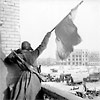USC Shoah Foundation – The Institute for Visual History and Education co-sponsored a March 7 lecture by Dr. Cathy J. Schlund-Vials on the memory work of Cambodian Americans whose films, memoirs, and music represent a largely unexamined site of critique on Cambodian memory in the aftermath of genocide.
The USC Shoah Foundation – The Institute for Visual History and Education is now accepting applications for a summer course that will allow USC students to study post-genocide conflict resolution in Rwanda.
"Rebuilding Rwanda: Memory, Testimony, and Living Together after Genocide" (IR-318, Conflict Resolution and Peace Research) will provide a practicum for students to consider the complex task that societies face in the aftermath of genocide.
USC Shoah Foundation – The Institute for Visual History and Education will support the Six Million Coins™ fundraising initiative, launched by Mount Sinai Memorial Parks and Mortuaries and the Jewish Federation of Greater Los Angeles to provide for Holocaust survivors in need of basic necessities.
What can the Institute’s Visual History Archive teach us about other mediations of the Holocaust: how survivors tell their stories, how life performance and other media shape their narratives, or even how humor figures into remembrance?
The United States Holocaust Memorial Museum (USHMM), in cooperation with USC Shoah Foundation – The Institute for Visual History and Education, hosted the 12th Southern California Teacher Forum on Holocaust Education, “Teaching about the Holocaust,” at the University of Southern California. Approximately 90 educators from the greater Los Angeles area attended the three-day program.
On February 11, Dr. Howard Gardner, best known for his theory of multiple intelligences, engaged in a public conversation on the art science of 21st-century education with Dr. Mary Helen Immordino-Yang, an award-winning behavioral and social scientist and faculty member at the University of Southern California.
Three professional-development videos for secondary-school teachers are now available on the Institute’s website. The videos, which average 25 minutes in length, delve into the theory and practice of using testimony for education and digital tools such as IWitness.
On February 2, we commemorated the 70th anniversary of the decisive WWII Battle of Stalingrad. That battle changed the course of the war, leading to the final victory over Nazi Germany. As many as two million lives may have been lost at Stalingrad. We invite you to watch edited and subtitled clips from testimonies of three Red Army veterans who participated in the frontline fighting. The Visual History Archive of USC Shoah Foundation contains interviews with hundreds of Allied liberators and Jewish war veterans from all fronts of WWII.

